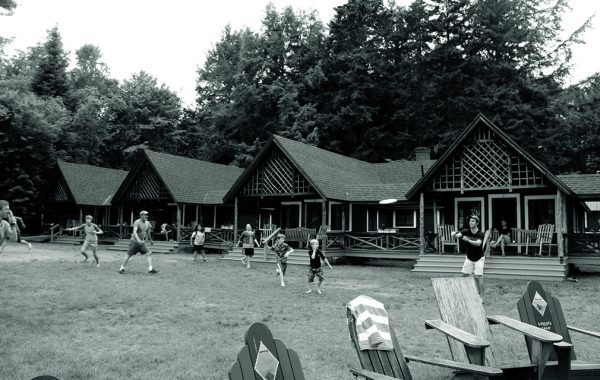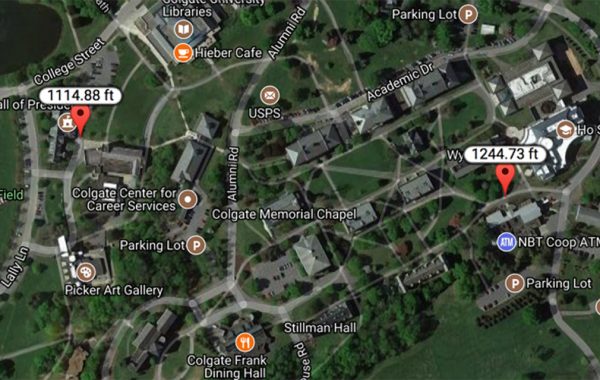Colgate Camp memories

I enjoyed your article on Colgate Camp (“Adirondack retreat,” summer 2017, Page 13) almost as much as I enjoyed being there a few times in the early ’60s.
One visit was in January, as I recall. The Outing Club was able to stay there (knotty pine and outdoor plumbing) and go skiing at the Lake Placid Club, mostly because the Colgate Thirteen were performing at the resort.
Freakish temperature drop, 45-50 below zero one night! Guys chopped through the ice in the lake for water, and chips formed on the sloshing pail as they lugged the pot to the kitchen. The old wood stove was kept glowing hot when we weren’t using the Lake Placid Club facilities, which we did as much as nature and willpower would allow. The ice cream we brought with us from the Student Union never did get soft! Learning the rudiments of skiing in such cold weather was an instructive experience and a lifelong memory. Glad to see that many others are still able to enjoy the camp.
Bill Badenoch ’68
Huntington Beach, Calif.
Removing the Cutten name
I think the name change is wonderful (“Board of Trustees votes to remove Cutten name,” summer 2017, pg. 11). I do hope there will also be a way to keep some recognition in the building (maybe a plaque) of why the name was changed so that we don’t forget that difficult history altogether. American history has plenty of examples of terrible consequences of eugenics in practice (such as compulsory sterilization laws in the early 20th century), and we are still experiencing the legacies of this sort of racist thinking today.
Interestingly, we were just reading a book with our students here at Loyola University Chicago about the era of civil rights leader Adam Clayton Powell Jr. ’30. Powell was one of the very few black students on campus during Cutten’s presidency, and because of the racism he expected on campus, Powell chose to “pass” as white at first, because he was very light-skinned.
I’m glad that the board pushed this long-overdue process forward. Georgetown University was just in a similar situation, having finally renamed buildings that had been named after two Jesuits who were responsible for the sale of 272 enslaved people to pay the school’s debts.
Cutten finally being renamed is great news. Though there’s a lot more work to be done ahead, I think this is a wise step for Colgate’s future.
Henoch Derbew SJ ’07
Chicago, Ill.
I read with dismay the article about former President Cutten. As the fates would have it, an article was published today in Health Impact News concerning the history and present state of affairs relating to eugenics. It is a long article that I will not attempt to summarize. It points out that the concept of and belief in eugenics was common on college campuses among students and faculty during the years of Cutten’s presidency. People more prominent than him were cited as believing in the concept, including George Bernard Shaw, H.G. Wells, and Alexander Graham Bell.
Since the end of the Cutten presidency in 1966, extraordinary discoveries relating to human, animal, and plant genomes have revived eugenics, but no one wants to have that progress or belief confused with the theoretical eugenic concept that existed in the past, and everyone seeks distance from any racial implication.
That brings us to the inspired decision of the university to purge Cutten from the collective memory at a time when most people have no idea who he was and why buildings were named after him. So, rather than appreciate what he did for the university, you have labeled him a racist demon.
Under the circumstances, I think it incumbent upon the administration to seek out all who generously contributed to the university endowment at Cutten’s urging and return the money to those donors or their heirs. The money has been forever tainted and corrupted by its having been solicited and received by this terrible racist former university president who had the nerve to believe in eugenics along with so many of his contemporaries. Diversity of thought and belief are no longer acknowledged on the campus or in the board room. Death to the nonbeliever and to the politically incorrect, even if he may have been correct after all.
Paul Jaffe ’59
Chappaqua, N.Y.
The article “Board of Trustees votes to remove Cutten name” caught my eye this evening. I had just finished reading an op-ed in our local newspaper in Pennsylvania about Margaret Sanger, founder of Planned Parenthood, who, like President George Barton Cutten, also strongly believed in the value of eugenics and supported the process by which the poor, immigrant, and “feeble-minded” populations were sterilized so that they could not reproduce and create a less-than-perfect society. This is only one of many similar articles about Sanger that I have read recently.
Though it matters not to me what this residential complex is named, the similarity between the beliefs of Cutten and Sanger should open the door to what could be some interesting dialogue on an “open-minded” campus. I am curious whether Colgate University and its current students, after having given consideration to Cutten’s efforts to “limit diversity” and “advocate for eugenics,” have done the same to the not-so-well-known comparable efforts of the internationally known Sanger. At the very least, the comparison should cause one to pause and to consider the impact of this eugenics advocacy on the founding principles of Planned Parenthood.
Janie (Mary Jane C.) Miller ’73
New Ringgold, Pa.
It is becoming apparent that naming buildings for individuals is fraught with danger. We are discovering that these individuals have done or said something during their lifetimes that is offensive to today’s society. I would like to suggest that all buildings named for individuals and/or corporations be removed and be replaced with generic names. Good examples are East and West halls. The Case Library (named for Everett Case) can simply be renamed the “Library,” which it is probably already called by most people on campus.
I will be happy to serve on a naming committee to tackle the task of finding appropriate generic names for the buildings that currently are named for individuals. This should resolve any future issues with concerns about past sins.
Tom Gamble ’64
Birmingham, Ala.
Raiders, coworkers, change makers
For seven years I have volunteered at the George Jackson Academy (GJA), an independent school for boys in grades 4–8 on the Lower East Side of New York City. I teach a decision-making course in which we focus on assessing consequences, risk taking, discovering what one values in making a choice, and dealing with team and consensus dynamics. This year I had a pleasant surprise when I found there were four Colgate alumni on the staff: Bernadette Sarlo ’07, Iman Aswad ’01, Franchesca Petrillo ’12, and Alyssa Berger ’16. They have come from public schools, the corporate world, and graduate programs.
It was a real pleasure to share insights and learning with this group about the school. GJA is a special place. Admission is need-blind, and a majority of students come from difficult neighborhoods, commuting more than an hour each way on public transportation. The mission of GJA is to prepare and place students in top local high schools and private day and boarding schools across the country. The academics are rigorous, but the success rate for GJA graduates is incredibly high as they move through high school and college.
I have seen these success stories firsthand because a number attend Camp Moosilauke, our family’s camp, first as campers and, ultimately, as counselors. Some attend boarding schools such as the Thatcher School in Ojai, Calif., where my daughter Sabina ’84 and her husband, Bill McMahon ’84, work. The boys do well even that far from home.
So I asked the group: Why this career choice? All felt it was clear that they were able to make a difference, and this was a high motivator. In addition, they cited the ability to create and participate in a close-knit community where they could be effective mentors for the boys. As one person put it, “We prepare the kids well, and as they begin to see the light at the end of the tunnel, we make sure they go for it.” The mutual respect between faculty and students also helps compensate for modest salaries that are common in the education field.
Then I asked about experiences at Colgate that helped them be effective. They mentioned the COVE program, working in the local community, and pursuing real-world opportunities beyond the comfort zone. These actions also helped them define what success means to them individually.
What a nice small-world happening.
Gordon Miller ’56
Orford, N.H.
Climbing the Hill

Thinking back to the early 1970s when breakfast was in the Hall of Presidents (then the Student Union) and we trudged up the Hill to class, I was wondering just how big a hill it was. Imagine my surprise when I went to a GPS site and found that the trek up the hill to the Coop just so happens to be 1,245-1,115 feet elevation, which equals 130 feet (13 stories!).
Mark Haas ’76
Gaithersburg, Md.
The Scene welcomes letters. We reserve the right to decide whether a letter is acceptable for publication and to edit for accuracy, clarity, and length. Letters deemed potentially libelous or that malign a person or group will not be published. Letters should not exceed 250 words. You can reach us by mail, or e-mail sceneletters@colgate.edu. Please include your full name, class year if applicable, address, phone number, and/or e-mail address. If we receive many letters on a given topic, we will run a representative sample of the opinions expressed.






